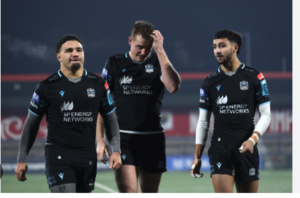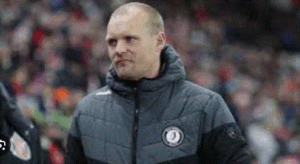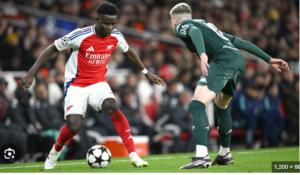
On the first weekend of the new United Rugby Championship season, the Glasgow Warriors’ incredible defensive performance against Ulster on Saturday night did not result in a victory, but it did yield an astounding statistic.
Over the course of the more than 80 minutes at the Kingspan Stadium, the team made 327 tackles, a statistic that made the former full-back extremely proud, according to the club’s defence coach, Pete Murchie.
In the second half of their 20-19 loss, Glasgow saw two players receive yellow cards and spent extended periods of time encamped on their own line against constant Ulster raids. In the 72nd minute, Dave McCann eventually broke over the line to give Ulster the lead for the first time in the game. Two minutes later, a converted try by Kyle Steyn gave Glasgow a 19–15 lead, but Dave Shanahan, the home team’s substitute scrum-half, eked out a last-second steal. Murchie experienced mixed emotions following the team’s incredibly resilient performance.
“We put in a huge effort and made 327 tackles, which is certainly not a number that we’ve had since I’ve been defence coach,” said Murchie who joined the coaching staff at Scotstoun three-and-a-half years ago. “A huge amount of effort went into it. But ultimately, coming out on the wrong side of the result and obviously the timing of it, it was tough to take.
“There are always things you can look at alongside that. We need to look at how they got entries because, to be honest, it was only happening a couple of metres out. But the thing about the game, and that’s the good thing about the game, is it doesn’t matter whether you score a try from your own line or whether you score from six inches out, a try’s a try. It counts for the same amount of points.”
Tom Jordan and Richie Gray were sin-binned in quick succession and Glasgow were down to 13 men at one point in the second half, leaving them under the sort of pressure which necessitated such a huge defensive effort. Glasgow only had nine per cent possession in the final 10 minutes compared to Ulster’s 91 per cent. Of the 327 tackles, Rory Darge made 39 of them which is reckoned to be the highest total by a Warriors player since Jonny Gray made 43 against Leinster five years ago. To put it in perspective, Murchie reckons Glasgow’s average for tackles per match is around the 150 mark.
“If you’re in the 200s, that’s huge,” said the coach. “I can’t remember seeing a game where a team has made 300. Not just that we’ve been involved with, obviously it’s happened before. You don’t want to be making 327 tackles. It’s a sign you don’t have the ball.
“It was clear that the moment TJ [Tom Jordan] received a yellow card was crucial to the outcome of the match. In their 22, they were in a lineout. Jamie Dobie had just applied some pressure with a well-placed kick. In my opinion, they had lost their previous lineout in that section of the field.
“Yellow card, TMO enters. We are protecting our own ten. For the following twenty minutes of the game, I don’t think we touched the ball at all. We reduced to thirteen. That kind of swing was a significant point in the game.
Belfast’s tackle total came dangerously close to being a Glasgow team record. The aforementioned Leinster match, which took place at the RDS in April 2019 and saw Grey dominate, holds that distinction, with the Warriors making 340 tackles that day.
“I think Rory Darge made 39 this week,” added Murchie. “And Gregor Hiddlestone played 20 minutes and made 27 tackles. It shows the attritional nature of the game and Ulster’s ability to hold on to the ball for that long, you have to credit where credit’s due. To hold on multiple times takes skill in itself. You have to say fair play to them. It was a great contest, both sides of the ball. Us holding out and them being relentless at sticking to that.”
While generous in his praise of Ulster, Murchie had a more general grouse regarding the attacking side being favoured in situations such as Saturday’s when the refereeing odds seem stacked against a team defending its own line. Try-scoring and entertainment are to be encouraged, of course, but not at the expense of making it a genuine contest, said the coach who watched Ulster gain penalty advantage time and again.
“Do they want us to defend the goal line?” he asked. “Because it seems like as soon as you get to that area of the pitch, there’s only one side of the ball that’s getting refereed and it’s defence. So yeah, if they generally want a contest in the game, then it needs to get refereed that way. So there’s frustration there as well, around some of those decisions.

“A lot of the law variations are about speeding up the game and looking at how you can score more tries and get more points. And I get that. It’s important, it’s about entertainment value. But it’s a game of contests, isn’t it? And that keeps getting referred to. That’s why we’ve got scrums, that’s why we have lineouts, that’s what stops it from being rugby league. So we want to be able to contest.
“I’m proud of the effort the boys put in on the goal line, 20, 30 phases at times, a metre out from our line. But are we allowed to contest? Are we allowed to defend in that area? That’s something that obviously is frustrating. Not for me, it’s a little bit frustrating, but more for the boys and the effort they’re putting in.”






